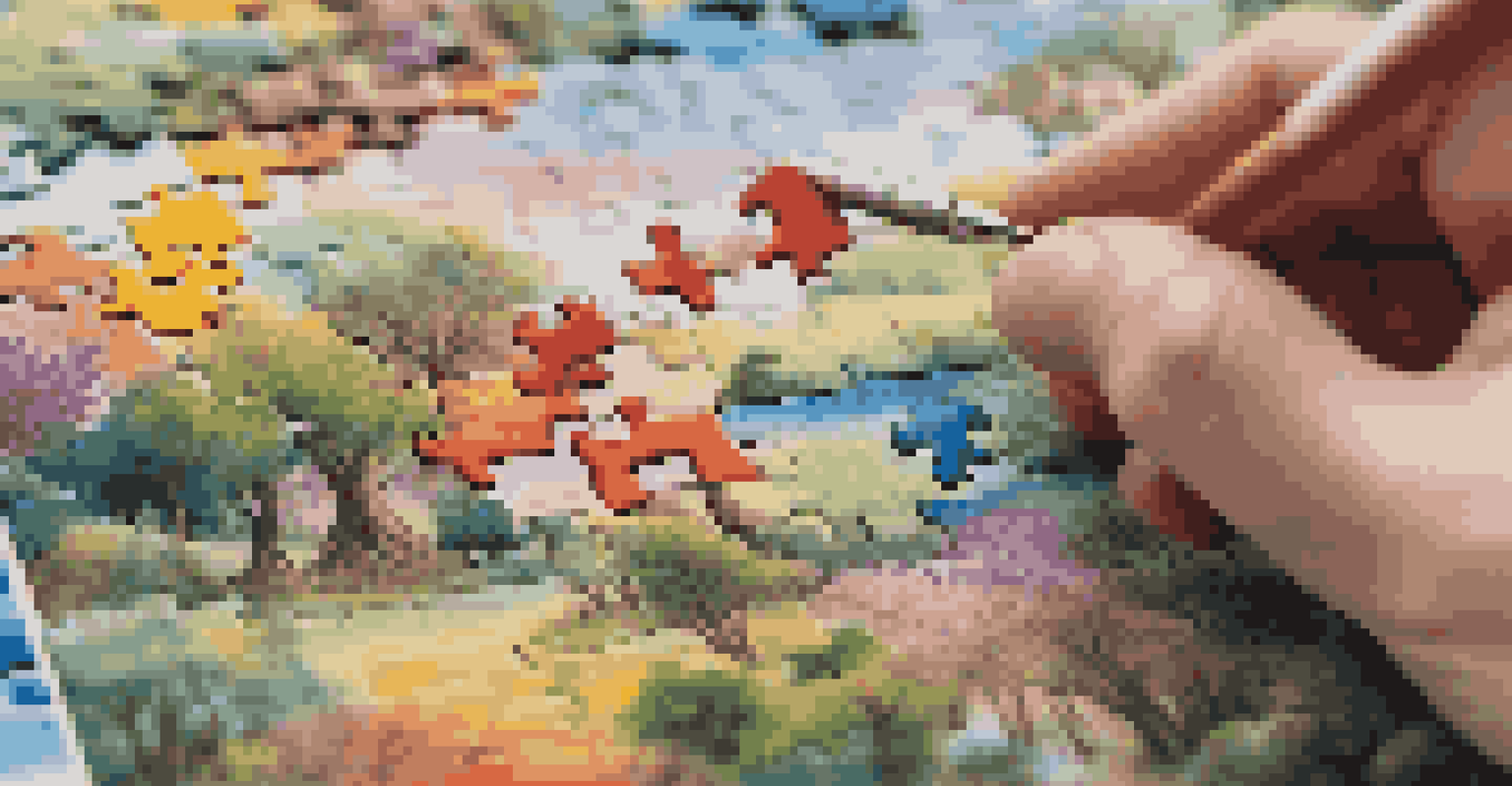Puzzle Challenges: Setting Goals for Personal Growth

Understanding Puzzle Challenges and Their Benefits
Puzzle challenges are engaging activities that stimulate the mind and promote problem-solving skills. They can range from jigsaw puzzles to logic games and even escape room scenarios. Not only are they fun, but they also serve as powerful tools for personal growth.
Life is a puzzle. You can’t force it, but you can piece it together one piece at a time.
When you tackle these challenges, you sharpen your cognitive abilities, enhance creativity, and improve your focus. Engaging in puzzles can be a wonderful way to unwind while simultaneously developing your mental agility. Think of it as exercising your brain in the same way you would your body.
Moreover, overcoming these puzzles can build your confidence and resilience. Each completed puzzle is a small victory that reinforces the idea that you can tackle bigger challenges in life, fostering a growth mindset.
Setting SMART Goals for Puzzle Challenges
To effectively use puzzle challenges for personal growth, you should set SMART goals—Specific, Measurable, Achievable, Relevant, and Time-bound. For instance, instead of saying, 'I want to do more puzzles,' you might say, 'I will complete two jigsaw puzzles of 500 pieces each within the next month.'

This structured approach helps clarify your objectives and enables you to track your progress. By setting measurable goals, you can celebrate small wins along the way, which further motivates you to continue. It's like having a roadmap for your journey of self-improvement.
Puzzle Challenges Boost Growth
Engaging in puzzle challenges enhances cognitive abilities, creativity, and focus while promoting personal development.
Additionally, aligning your puzzle goals with personal interests enhances engagement. If you love nature, choose puzzles that feature landscapes; if you enjoy history, opt for scenes from different eras. This relevance makes the process enjoyable and meaningful.
Creating a Puzzle Challenge Routine
Incorporating puzzle challenges into your daily or weekly routine can help reinforce your commitment to personal growth. Consider designating a specific time each week for puzzle-solving, treating it as an essential part of your self-care. This establishes a habit that can lead to long-term benefits.
The only real mistake is the one from which we learn nothing.
You might even consider joining a puzzle club or an online community to add a social element to your routine. Sharing your progress and challenges with others can provide accountability and encouragement. Plus, it’s a great way to meet like-minded individuals who share your passion.
By making puzzle-solving a regular activity, you create a dedicated space for reflection and mental exercise. This consistency not only enhances your skills but also allows you to observe your growth over time, making it easier to adjust your goals as needed.
Tracking Progress and Celebrating Achievements
Tracking your progress in puzzle challenges is crucial to understanding your growth journey. You can maintain a simple journal or use an app to log the puzzles you complete, the time it takes, and the skills you feel you’ve improved. This way, you can visually see how far you've come.
Celebrating your achievements, even the small ones, is equally important. After completing a challenging puzzle, treat yourself to something special, like a favorite snack or an evening out. This positive reinforcement helps build a stronger relationship with your goals and keeps your motivation high.
Set SMART Goals for Puzzles
Establishing Specific, Measurable, Achievable, Relevant, and Time-bound goals helps track progress and motivates continued engagement.
Moreover, reflecting on what you’ve learned from each challenge can be incredibly beneficial. Whether it's patience in solving a tough puzzle or the joy of figuring out a tricky piece, recognizing these lessons fosters a deeper understanding of yourself and your growth.
Expanding Puzzle Challenges for Broader Growth
Once you've mastered basic puzzles, consider expanding your horizons with more complex challenges. This could mean tackling larger jigsaw puzzles, trying out intricate logic games, or even engaging in competitive puzzle-solving events. Each step up in difficulty promotes not only skill growth but also mental resilience.
You can also diversify the types of puzzles you take on. Incorporating word puzzles, Sudoku, or even online escape rooms can help develop different cognitive skills. This variety keeps the experience fresh and exciting while continuously challenging your mind.
As you expand your puzzle repertoire, you'll likely find new interests and passions. Embracing different types of challenges can lead to unexpected personal growth opportunities, making your journey even more fulfilling.
Overcoming Challenges and Building Resilience
Encountering difficulties while solving puzzles is part of the process, and learning to navigate these challenges is key to personal growth. Embrace the frustration that comes with a tough puzzle; it's an opportunity to enhance your problem-solving skills. Remember, every great achievement requires perseverance and grit.
When faced with a particularly challenging puzzle, take a step back and reassess your approach. Sometimes, a fresh perspective can lead to breakthroughs. This practice of reflection and adjustment is not only valuable in puzzle-solving but also in everyday life challenges.
Learn Resilience Through Puzzles
Overcoming difficulties in puzzle-solving builds resilience and problem-solving skills that are applicable in everyday life.
Building resilience through puzzles teaches you to keep trying, even when things get tough. Each challenge you overcome reinforces the idea that persistence pays off, helping you tackle obstacles in other areas of your life with greater confidence.
Incorporating Lessons into Daily Life
The skills and lessons learned from puzzle challenges can easily be applied to daily life. For example, the patience you develop while working on puzzles can help you manage stress during challenging situations at work or home. This transfer of skills enhances your overall personal growth.
Additionally, the problem-solving techniques honed through puzzles can improve decision-making in everyday scenarios. Whether it's navigating a complex project or making important life choices, the analytical skills acquired from puzzles can guide you in finding effective solutions.

Ultimately, viewing life as a series of puzzles can shift your perspective. Each challenge becomes an opportunity for growth, and with the right mindset, you can approach obstacles with curiosity rather than fear, fostering a lifelong journey of personal development.